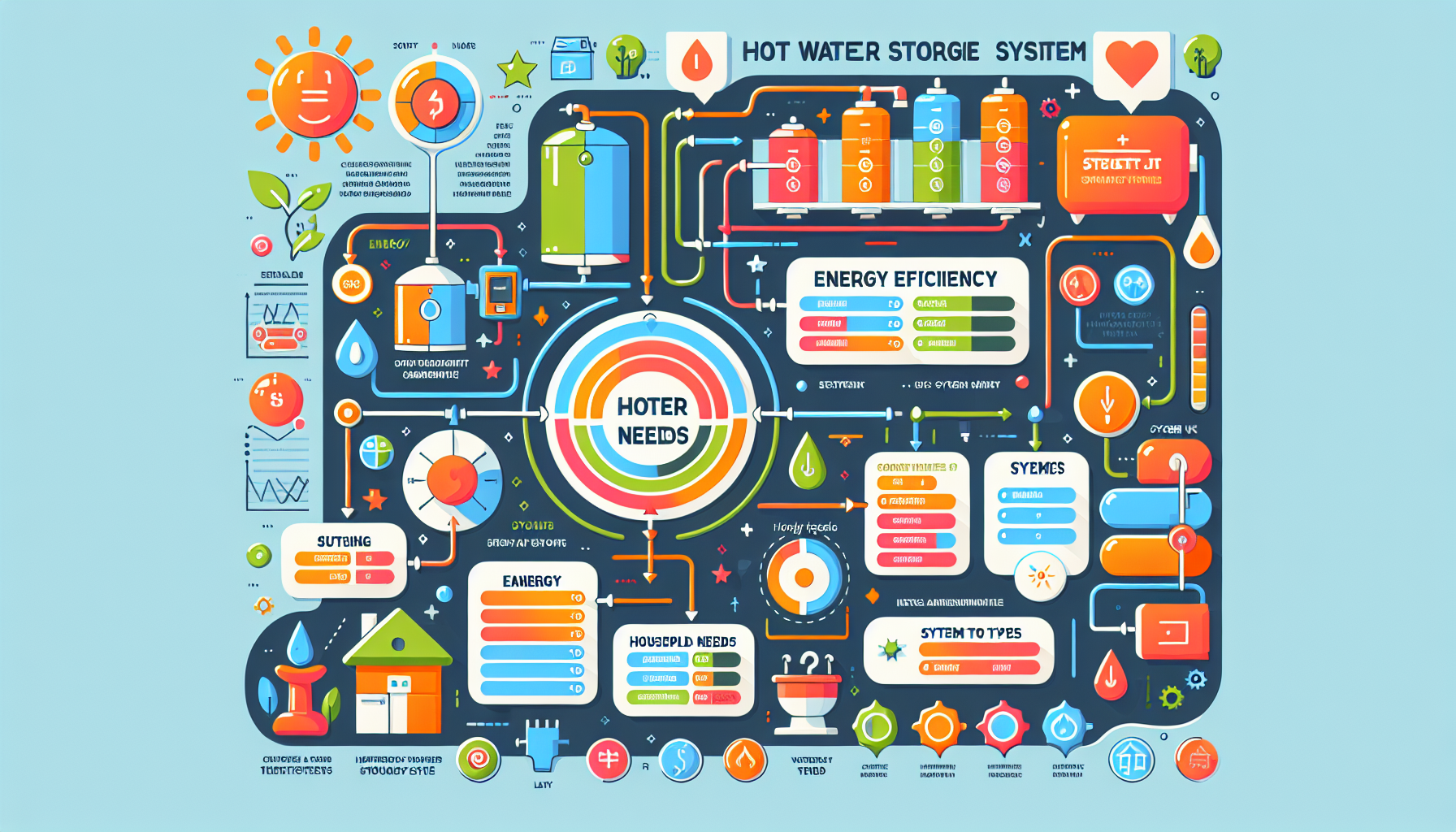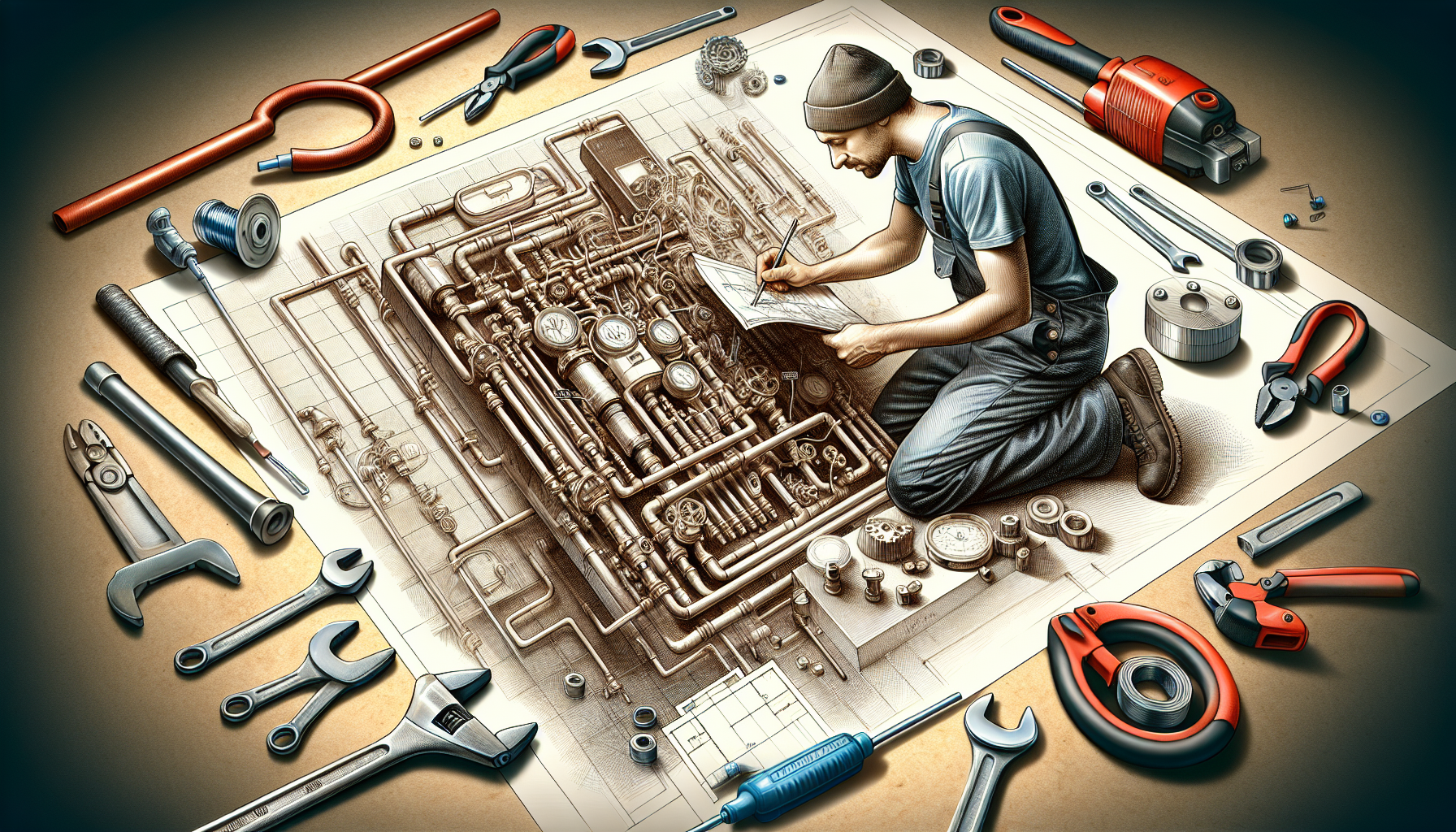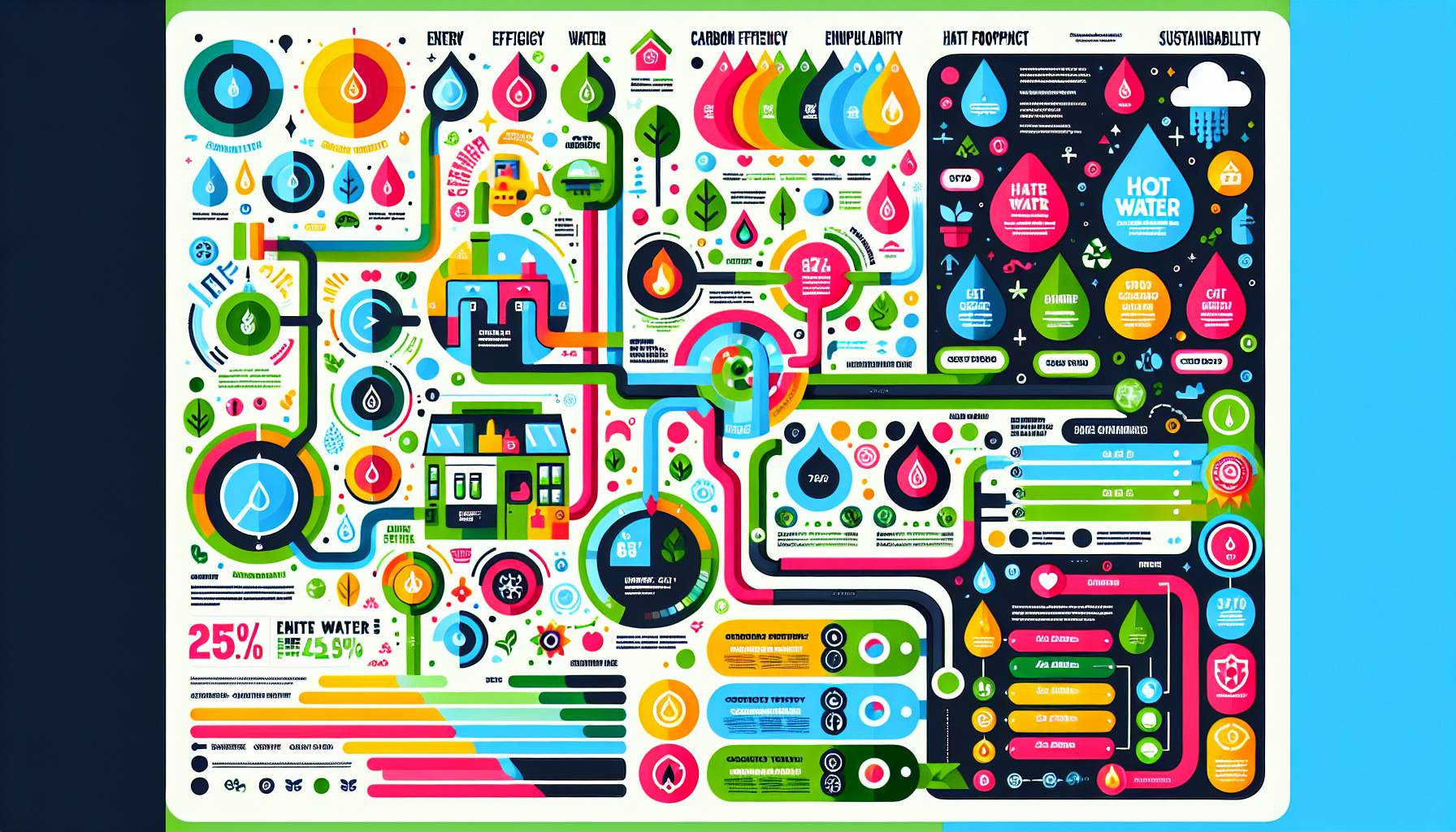Top Hot Water Storage System Solutions | Efficient & Reliable Heating
A hot water storage system heats and stores water for your home, ensuring you always have hot water when you need it. These systems use storage tanks and heating elements to maintain the water at a desired temperature, offering a convenient and energy-efficient solution for daily activities like bathing, cooking, and cleaning. In this article, we’ll explore how these systems work, the different types available, and how to choose the right one for your home.
Key Takeaways
-
Hot water storage systems ensure a continuous supply of hot water, utilizing storage tanks and heating elements to maintain temperature efficiently.
-
Choosing the right system involves assessing household hot water needs and comparing energy efficiency ratings to optimize costs and sustainability.
-
Regular professional installation and maintenance are crucial for the safety and efficiency of hot water systems, impacting performance and longevity.
Understanding Hot Water Storage Systems

Hot water storage systems are designed to heat and store water for domestic use, ensuring a steady supply of hot water whenever needed. These systems typically utilize storage tanks to hold pre-heated water, while heating elements maintain the desired temperature. A thermostat regulates this temperature, ensuring energy is used efficiently while keeping the water hot. This setup provides on-demand hot water, significantly enhancing convenience and comfort in the home.
These systems play a critical role in residential heating, supporting various daily activities such as bathing, cooking, and cleaning. Storing heated water reduces the time and energy needed to heat water on demand, offering an energy-efficient solution for many households.
How Hot Water Storage Systems Work
Hot water storage systems operate by directing cold water into a tank where it is heated by electric or gas elements. Electric storage systems use heating elements within the tank to warm the water, maintaining a temperature above 60°C to prevent bacterial growth. This setup not only keeps the water hot but also maintains hygiene standards in storage hot water systems.
Gas hot water systems use a burner and a heat exchanger to warm the water. These systems are known for their energy efficiency and faster heating times.
Regardless of the type, the primary goal of these continuous hot water systems is to provide a continuous supply of hot water for household needs.
Types of Hot Water Storage Systems
There are several types of hot water storage systems, each with its unique advantages. Gas hot water systems heat water using a sensor-triggered gas burner and a heat exchanger, storing the heated water for immediate use. These systems are popular for their energy efficiency and lower long-term energy costs. However, they can experience high heat loss in colder climates, which can affect their efficiency.
Electric hot water systems, including storage tank models and continuous flow units, offer diverse options to meet various needs. Electric storage units heat water using an electric element in an insulated tank, with temperature regulated by an Electronic Control Unit (ECU) and an adjustable thermostat. Continuous flow models heat water on demand, providing endless hot water and greater energy efficiency compared to traditional storage systems. An electric water heater can be a great addition to your home for reliable hot water access.
Solar hot water systems are also gaining popularity due to their environmental benefits and potential for cost savings. A solar hot water system can significantly reduce energy costs.
Choosing the Right Hot Water Storage System for Your Home

Selecting the right hot water storage system involves understanding your household’s hot water consumption patterns and comparing energy efficiency ratings. Accurately assessing your hot water needs is crucial to ensure that the system you choose can meet your household’s demands without unnecessary energy waste.
Energy efficiency ratings are another important factor to consider. Systems with higher ratings can lead to greater long-term savings on energy costs and are generally better for the environment. Carefully evaluating your needs and the efficiency of different systems will help you make a balanced decision regarding performance, cost, and sustainability.
Assessing Household Hot Water Needs
Assess your household’s hot water needs by considering the number of occupants and their usage patterns. A general guideline suggests estimating a need of 4 liters of hot water per person each day. Factors such as the type of showerheads and faucets can significantly impact the total hot water requirement. For instance, low-flow fixtures can reduce water usage, thereby lowering the demand on your hot water system.
Planning for future changes, such as increased occupancy or shifts in usage patterns, is also crucial. By taking these factors into account, you can choose a system that not only meets your current needs but is also scalable for the future.
Comparing Energy Efficiency Ratings
Energy efficiency ratings are crucial for making an informed decision. Models with higher energy efficiency ratings can lead to substantial savings on energy costs over time. Higher Energy Factor (EF) ratings indicate better efficiency and lower costs for consumers.
Modern gas hot water systems typically achieve a minimum energy efficiency rating of 6 stars. Heat pumps are another energy-efficient option that generates lower carbon emissions compared to traditional gas systems, making them a more environmentally friendly choice.
Top Brands and Models of Hot Water Storage Systems

When it comes to choosing a reliable hot water storage system, brands like Rinnai, Bosch, and Rheem are often at the top of the list. These companies are known for their innovative technology, efficiency, and long-standing reputations for quality.
Rinnai, Bosch, and Rheem offer a wide range of products that cater to various household needs, ensuring that you can find the right hot water system for your specific requirements. Let’s take a closer look at the standout models from each of these brands.
Rinnai
Rinnai is renowned for its efficient and reliable hot water systems. The Rinnai B26 model, for example, uses heat exchanger technology to transfer heat to water, providing an efficient heating solution. With a hot water delivery rate of 26 liters per minute, it is suitable for small to medium-sized households.
The Rinnai B26 features a compact design and high performance. It is also recognized for its cost-effective operation, ranking it among the top-performing models. This model ensures that households can enjoy a continuous supply of hot water without significant energy waste.
Bosch
Bosch is another leading brand in the hot water system market, known for its innovative features and high efficiency. The Bosch HydroPower model offers adjustable temperature controls for seasonal conditions, enhancing user convenience. This model ensures a stable temperature output with its hydropower ignition, contributing to consistent performance.
Bosch’s commitment to efficiency and sustainability is evident in their ignition solutions, which aim to reduce environmental impact. These features make Bosch hot water storage systems a preferred choice for environmentally conscious consumers.
Rheem
Rheem has been a prominent name in the hot water system market since 1939, demonstrating a long history of experience. Their product line includes various models such as the 135L, 170L, Stellar series, Continuous Flow series, Metro series, Pronto series, and Hiline series.
A notable safety feature of the RheemPlus line is its maximum temperature delivery, designed to enhance safety. Rheem’s extensive range ensures that there is a model to suit every household’s needs, providing reliable and efficient hot water solutions.
Installation and Maintenance of Hot Water Storage Systems

Proper installation is critical for the safety, efficiency, and longevity of hot water storage systems. Hiring licensed professionals for installation ensures compliance with safety regulations and helps avoid common pitfalls. Routine maintenance is equally important to keep the system running efficiently and extend its lifespan.
Annual inspections and servicing are vital for maintaining the system’s efficiency and functionality. By investing in proper installation and regular maintenance, you can ensure your hot water system remains reliable and cost-effective over time.
Professional Installation Tips
Hiring a licensed gas fitter is crucial when installing a gas hot water system to ensure adherence to safety regulations and standards. A professional plumber will install the system correctly, preventing hazards and ensuring efficiency.
Avoiding installation errors is key for the system’s long-term functionality. For instance, ensuring the system is filled with water before powering it on can prevent damage. Always relate any business back to professionals like JR Gas & Water for reliable service solutions.
Regular Maintenance Practices
Yearly inspections are vital to identify potential issues early, ensuring long-term system reliability. Regularly draining the system helps prevent sediment buildup, which can maintain efficiency. Flushing the hot water tank periodically also helps remove sediment buildup and improve the system’s performance.
Testing the temperature and pressure relief valve is another crucial maintenance practice to prevent system failure. Following these maintenance tips ensures your hot water storage system operates efficiently and has a longer lifespan.
Environmental Impact of Hot Water Storage Systems

The type of hot water system you choose can significantly impact your energy bills and environmental footprint. Gas hot water systems are known for their efficiency. However, they are anticipated to increase in cost because of rising gas prices by 2030.
Opting for environmentally friendly options like solar hot water systems can drastically lower carbon emissions compared to gas and electric systems. Understanding these impacts aids in making a more sustainable choice for your home.
Comparing Environmental Impacts
Solar hot water systems are the most environmentally friendly option, significantly reducing carbon emissions compared to gas and electric systems. A conventional gas hot water system contributes significantly more to greenhouse gas emissions over time than a high-efficiency heat pump.
Electric hot water systems can utilize renewable energy sources, making them a more sustainable option. Electric heat pumps are also efficient and produce less environmental impact compared to traditional storage systems.
Enhancing Efficiency with Solar Integration
Solar energy integration with hot water storage systems can significantly boost energy efficiency. Electric hot water systems can maximize your home’s solar energy use, reducing reliance on fossil fuels.
Models like Rinnai B26 and Rheem Hiline are examples of gas hot water systems that are compatible with solar energy. Integrating solar energy into hot water systems promotes environmental sustainability and can lead to cost savings over time.
Cost Considerations for Hot Water Storage Systems
Understanding upfront and operating costs is crucial for budgeting effectively when installing hot water storage systems. The total cost is influenced by installation complexity, unit type, and household needs. Hiring a licensed professional ensures compliance with safety regulations during installation.
Investing in high-quality systems and proper installation can lead to greater energy efficiency and savings over time. Considering both upfront and long-term costs helps you make a cost-effective decision.
Upfront and Installation Costs
The average pricing for Rinnai hot water systems ranges from $500 to over $2,000, depending on features and capacity. Rheem’s hot water systems typically cost between $500 and $1,500 on average, excluding installation fees. Installation prices vary widely, typically ranging from $260 to $690 for straightforward replacements.
Switching the energy type of a hot water system can incur additional costs between $1,500 and $3,000. Budgeting for a hot water storage system requires considering both upfront costs and installation expenses.
Operating Costs and Savings
The operating costs for hot water systems can differ greatly. This variation depends on the specific type of system selected. For example, electric hot water systems can have annual running costs up to $950, depending on the energy tariff. In contrast, high-efficiency solar hot water systems can significantly reduce running costs, with annual expenses potentially as low as $180.
Energy-efficient practices and technologies can lead to substantial savings on ongoing operating costs. By choosing systems with higher energy efficiency ratings and integrating renewable energy sources like solar, you can achieve significant long-term savings and reduce your environmental footprint.
Summary
Selecting the right hot water storage system is essential for ensuring a reliable and efficient supply of hot water in your home. Understanding how these systems work and the different types available, such as gas, electric, and solar, can help you make an informed decision. Top brands like Rinnai, Bosch, and Rheem offer reliable and efficient options that cater to various household needs.
Proper installation and regular maintenance are crucial for the longevity and efficiency of your hot water system. Considering the environmental impacts and cost considerations, including upfront, installation, and operating costs, can help you choose a system that balances performance, sustainability, and affordability. By making informed decisions, you can enjoy the benefits of a reliable hot water supply while minimizing your energy costs and environmental impact.
Frequently Asked Questions
What is the advantage of electric hot water systems in areas with renewable electricity?
Electric hot water systems are advantageous in areas with renewable electricity because they significantly reduce environmental impact, utilizing cleaner energy sources. This aligns with sustainable living practices and supports a reduction in carbon emissions.
What can an electric hot water system do if you have solar panels?
An electric hot water system can optimize the energy generated by your solar panels, allowing you to reduce reliance on fossil fuels and enhance overall energy efficiency in your home.
What are some critical factors to consider when selecting an electric storage hot water system?
When selecting an electric storage hot water system, it's crucial to consider the capacity, energy efficiency, type of tank, installation requirements, and brand reputation. These factors will ensure you choose a system that meets your needs effectively.
How does JR Gas & Water prioritize customer relationships?
JR Gas & Water prioritizes customer relationships by ensuring a seamless and stress-free experience, fostering lasting connections with clients.
What community involvement does JR Gas & Water emphasize?
JR Gas & Water emphasizes strong community involvement by prioritizing support for local businesses and organizations, actively believing in giving back to the community.




























